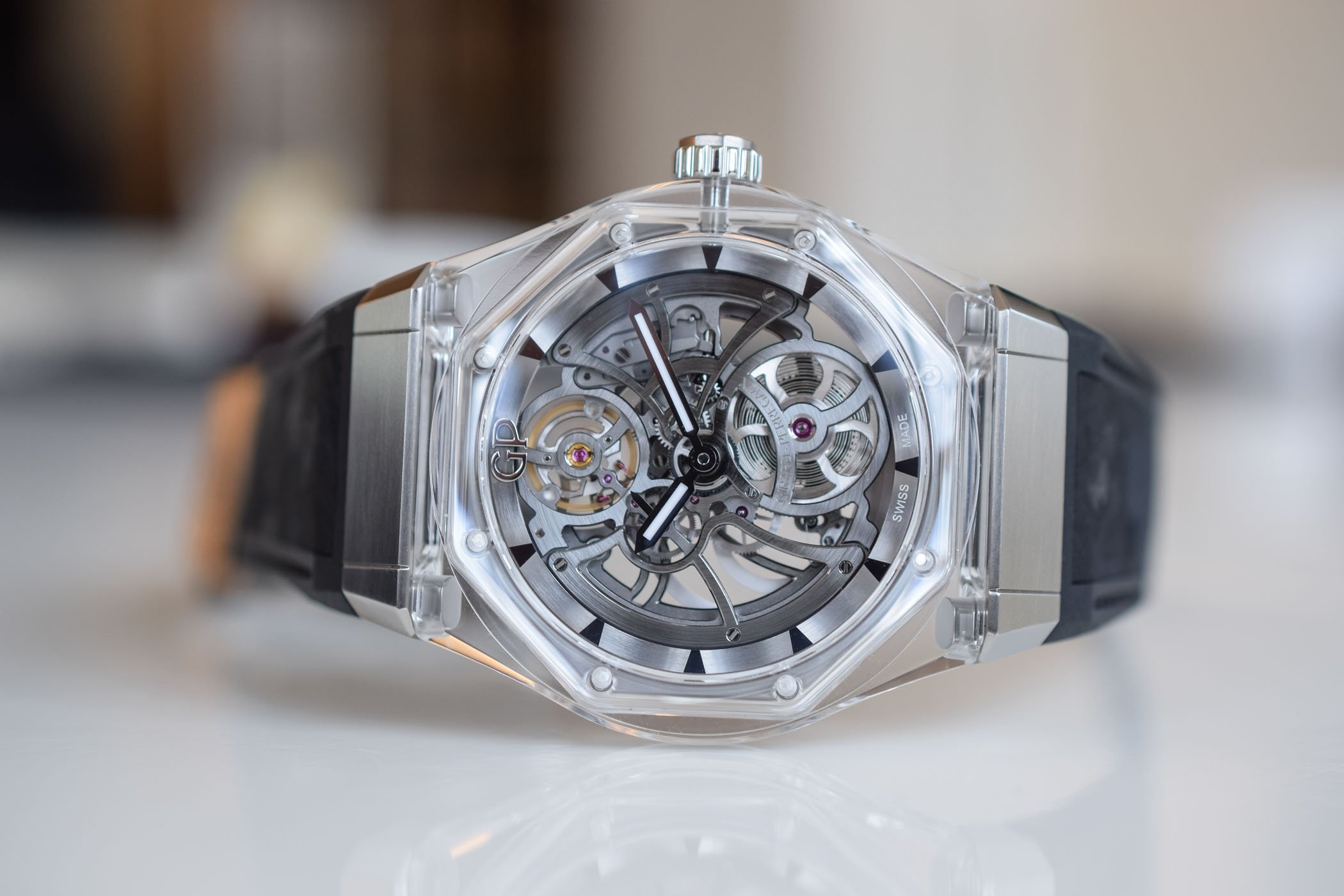Girard-Perregaux Laureato Absolute Light
Let there be light! A diaphanous sapphire case combined with lightweight titanium reveal the skeletonised movement.

For once, a watch is given a name that makes sense! The Laureato Absolute is a study in light: thanks to the titanium structural elements of the case, the Girard-Perregaux Laureato Absolute Light is lightweight, and thanks to its sapphire crystal case, light penetrates and illuminates the skeletonised movement. A limited-edition of 88 pieces, this latest iteration transforms the technical components of the movement into design elements. Although we’ve already seen something similar in the form of 2019 GP Laureato Skeleton “Earth to Sky” Edition, a skeletonised model with the same calibre 1800, this new model notches up the light factor even further.
Brief background of the Laureato
Like many brands, Girard-Perregaux is exploring the world of high-tech materials to give a fresh face and attitude to its core and ever-growing Laureato collection. When it was first introduced in 1975, the Laureato was positioned as the brand’s take on the luxury sports watch, a new genre that had just hit the markets in 1972 onboard Gérald Genta’s trailblazing Royal Oak for Audemars Piguet. Originally presented in a matte steel case with touches of gold, the modular design of the Laureato was distinguished by its polished gold octagonal bezel, a cushion-shaped case, an integrated bracelet with a gold stripe and a white hobnail pattern embossed on the dial.
Designed by a Milanese architect, the raised octagonal bezel was the commanding feature of the first Laureato, prompting multiple comparisons with the Royal Oak. However, unlike the Royal Oak, the Laureato was fitted with a slim, ultra-precise quartz movement. After all, GP had pioneered the serial production of quartz movements in the 1970s. The first Laureato was fitted with the ultra-thin calibre 705 with a frequency of 32,786 Hz (setting the benchmark for quartz movement timekeeping) and the words Quartz Chronometer were printed on the dial. You can read all about GP’s groundbreaking quartz developments here.

Evolving over the years, the Laureato was eventually fitted with a slim GP 3100 mechanical calibre in 1995. In 2003, GP launched the Laureato EVO 3, a 44mm model with a visible black rubber seal inserted between the case and bezel. Just before it faded into oblivion, the Laureato tourbillon appeared with GP’s famous three bridges made out of sapphire. After many years lying dormant, the Laureato was resuscitated in 2016 with a marked return to its original values. First issued in 2016 in a limited edition to celebrate the brand’s 225th anniversary, it appeared again in 2017 as a full-fledged collection with a variety of case sizes, materials and complications.
Figures of eight
The 44mm sapphire crystal case of the Laureato Absolute Light might sound large but its invisible boundaries and practically transparent soul attenuate the size dramatically. The hallmark octagonal bezel, now reworked in sapphire crystal, features eight screws which traverse the thickness of the case (11.56mm, so not that thick) all the way to the octagonal caseback. For the first time, the mainplate is octagonal and is also held in place with the eight screws. The inner flange of the bezel no longer displays the hour indices and features a scalloped 12-sided design with contrasting polished and brushed surfaces. If you look closely, you’ll see that the mirror-polished areas form triangles and double up as hour markers.
Contemporary finishes
Contemporary to the core, the curvaceous openworked bridges and mainplate are NAC-treated in a dark anthracite colour and hand-decorated with four different finishes. The predominantly dark grey elements are punctuated with a touch of vivid pink (ruby bearings) and the brass regulating organ at 12 o’clock. What we are looking at here is the skeletonised GP01800-1143 calibre, a 30mm automatic movement beating at 28,800vph with a decent 54h power reserve. Basically, it is an openworked version of GP’s 1800 automatic calibre with hours, minutes and seconds and has appeared inside other skeletonised models, like this GP 1966 model celebrating the brand’s 225th anniversary.
A profusion of negative space on the ‘dial’ allows you to appreciate the gracefully curving bridges and plates with their bevelled edges. The off-centred and openworked barrel reveals the coiled mainspring and could almost work as a power reserve indicator…The hour and minute hands are also partially skeletonised and treated with luminescent material and there is a small seconds counter at 10 o’clock. Not perhaps the easiest to consult, it functions more as running indicator of the watch.
The reverse side is as well-executed as the dial revealing its openworked gold rotor and superlative finishes, including the hand-chamfered bridges. Continuing the flowing, modular aspect of this watch, the black rubber strap is seamlessly integrated under the titanium lugs and comes with a titanium folding buckle. The lugs, which are also brushed and polished, blend in perfectly with the dark grey tones of the movement.
Thoughts
I think you’ll agree that if you are going to show off a movement, it had better be an attractive, well-finished, in-house movement. In this case, GP has excelled and although I am not a fan of skeletonised watches, the view is extremely agreeable. Thanks to the graceful, curving bridges, the completely transparent sapphire case and the decidedly modern colour scheme, the Laureato Absolute Light will win over the hearts of those who don’t want to miss a beat of the fascinating mechanical action.
Availability and price
The Girard-Perregaux Laureato Absolute Light is limited to 88 pieces. The price will be EUR 71,280 or CHF 78,900. More information at girard-perregaux.com.











